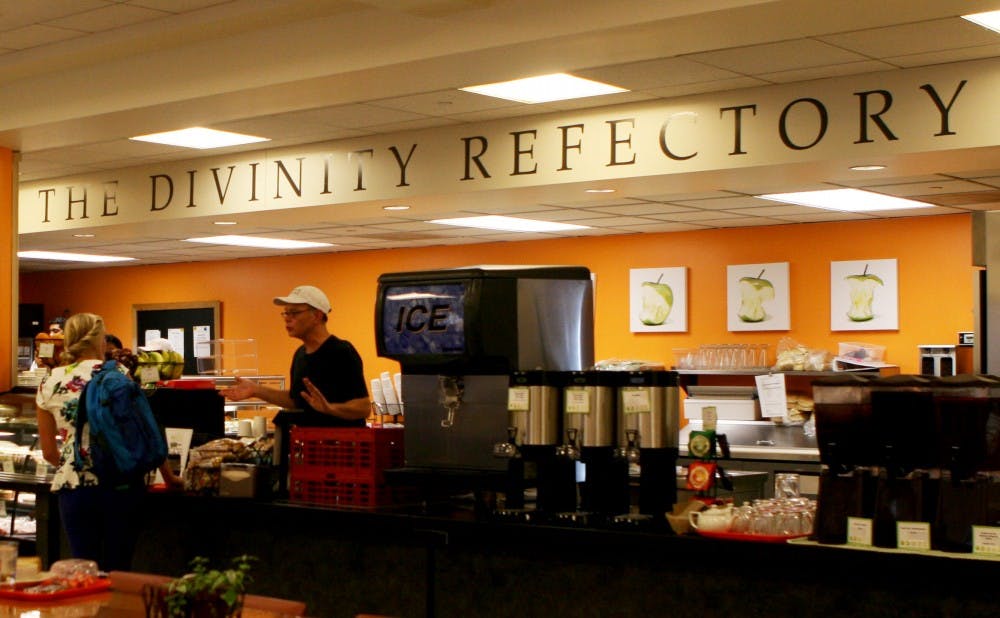Almost a year after The Divinity Refectory replaced the Refectory Café in the Divinity School, the Refectory Café's owner has filed a trademark infringement lawsuit, citing customer confusion over the eateries' similar names.
Bon Vivant Catering, the former operator of the Refectory Café in the Divinity School and current operator of the Refectory Café in the Law School, filed a complaint Aug. 30 in the district court of the Middle District of North Carolina, accusing Core Catering of trademark infringement. Core Catering operates the Divinity Refectory, which opened in August 2012.
According to the complaint, the United States Patent and Trademark Office issued Laura Hall, the owner of Bon Vivant, a trademark for “Refectory Café” on Nov. 27, 2012. The complaint also contends that Core used Bon Vivant’s recipes—identified in the complaint as trade secrets—in their Divinity Refectory.
Before founding Core and operating the Divinity Refectory, Pat Eder—co-owner of Core Catering Company of Durham—worked for Bon Vivant's The Refectory Café, along with other Core employees.
“This is a flagrant intent to confuse the public and intellectual property theft,” Laura Hall, owner of Bon Vivant, wrote in an email Oct. 23. “The only way to fix the situation was filing the complaint.”
Among other accusations, the complaint alleges Core's Divinity Refectory of profiting off of customers' confusion over the two eateries' similar names.
The complaint also argues that Core has misappropriated many signature Refectory Café items, such as kale salad with walnuts, chicken or tofu in a spicy peanut sauce, vegan chili, tomato soup and grilled cheese.
Core filed a brief and answer to the complaint Oct. 25, and denies the majority of claims made in Bon Vivant’s complaint.
According to Core's Oct. 25 brief, there is a lack of similarity between the two eateries and little confusion.
“The names of the restaurants are nothing similar; the plaintiff’s restaurant is The Refectory Café, Core's restaurant is the Divinity Refectory,” Core Catering stated in its brief.
Core’s brief also contends that they have no control over the name of the eatery.
“Duke University must suggest and approve the name of the restaurant,” stated the brief.
Vice President for Student Affairs Larry Moneta declined to comment on the situation. Pat Eder deferred comment to her attorney, Stephanie W. Anderson of the law firm Burton, Sue & Anderson, LLP, who also declined to comment.
Hall noted that she did not file a complaint when The Divinity Refectory initially opened in Summer 2012 because she did not want to hurt her relationship with Duke, and desired to keep her remaining location at the Law School.
Bon Vivant’s Refectory Café occupied the basement of the Divinity School from the time it opened in 2005. In Spring 2012, Duke Dining requested that Hall increase the annual commission she paid to Duke from 10 to 15 percent of gross revenue. Hall refused to do so, and the location closed in July 2012.
Rick Johnson, assistant vice president for housing and dining, was quoted in a June 20, 2012 Chronicle article saying that Divinity students were not happy with the Refectory Café’s menu.
“Divinity students wanted to broaden the menu and reduce the price,” Johnson said.
Duke Dining then listened to four proposals for occupying the Divinity School basement space, and ultimately selected Core to do so. In a competitive bidding process, Core was chosen unanimously for the contract, The Chronicle previously reported.
In an Aug. 20, 2012 Chronicle article, Johnson said that the University owns the Refectory name.
“There’s no trademark, because the last vendor didn’t create the name,” Johnson said in the August 20, 2012 story. “It was named before the last vendor was even in the building. The name Refectory was created by the Divinity School. And with the law school, the last vendor took that name and brought it over there.”
In an interview Hall said that she came up with the Refectory name when she bid for the contract in 2006. She said that the Divinity School originally wanted the eatery’s name to include Emmaus, but Hall suggested instead to call it The Refectory Café. Emmaus is an ancient town outside of Jerusalem that plays a part in the story of Jesus' resurrection in the New Testament.
“I was told you can’t do that because it’s like saying 'the café café,'” Hall said. “I said nobody knows what a refectory is, so we went ahead and called it the Refectory Café.”
The complaint also contends that an employee of Core contacted Cheftec—a website that Bon Vivant uses to store its trade secrets—and posed as a Bon Vivant affiliate to gain access to The Refectory Café’s information. According to the complaint, the phone call originated from the phone number for the Divinity Refectory.
Core denied this claim in the Oct. 25 brief, arguing that employees remembering recipes does not constitute a misuse of trade secrets.
Hall said she wishes she did not have to file the complaint, but feels it is necessary to eradicate the confusion that the similar eateries presents.
“The customers were so confused,” Hall said. “It happens every day. They think I am part of the Divinity School or that I’m not on campus at all. We just would like the confusion to go away.”
Get The Chronicle straight to your inbox
Signup for our weekly newsletter. Cancel at any time.

